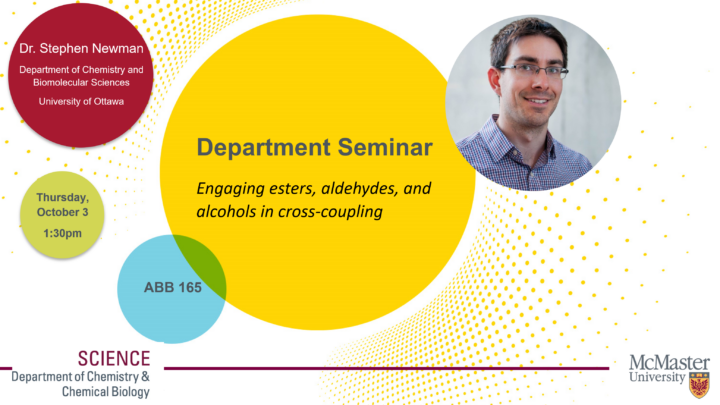Department Seminar: Dr. Stephan Newman
Oct 3, 2024
1:30PM to 2:20PM

Date/Time
Date(s) - 03/10/2024
1:30 pm - 2:20 pm
Title: Engaging esters, aldehydes, and alcohols in cross-coupling
Date: Thursday October 3, 2024
Time: 1:30-2:20pm
Room: ABB 165
Host: Dr. Jim McNulty
Abstract:
Catalytic cross-coupling reactions that unite simple organic building blocks continue to increase in scope, utility, and frequency of use. Progress in this field stems from improved mechanistic understanding, development of new catalysts, and identification of new functional groups that can be activated and engaged in cross-couplings and related transformations. In this seminar, strategies to incorporate esters, aldehydes, and alcohols into transition metal-catalyzed cross-coupling reactions will be discussed. The discovery process will also be detailed, including how a rational, mechanism-guided approach can act in synergy with high throughput experimentation techniques.
Biography:
Stephen grew up in Newfoundland, Canada before attending Dalhousie University, where he completed his B.Sc, Honours in Chemistry in 2008. During his studies, he completed research projects in computational chemistry with Prof. Russell J. Boyd and organic synthesis with Prof. D. Jean Burnell. He then moved to Toronto where he completed a summer internship on boron catalysis with Prof. Mark S. Taylor before starting his doctoral studies on with Prof. Mark Lautens. During this time, he investigated new pathways for palladium catalyzed C-C bond-forming reactions, and carried out an internship with Prof. Frank Glorius at the University of Muenster studying applications for NHC ligands.
Upon graduating, he moved to Boston to carry out research in the lab of Prof. Klavs F. Jensen at the Massachusetts Institute of Technology. There, he applied his knowledge of organic synthesis and catalysis to the development of continuous processes for chemical manufacturing in collaboration with Novartis AG and Shell Oil Company. In Summer 2014, Stephen joined the Center for Catalysis Research and Innovation (CCRI) at the University of Ottawa to apply strategies in flow chemistry and transition metal catalysis to the development of new, industrially relevant chemical reactions. He holds the Tier 2 Canada Research Chair in Sustainable Catalysis, received the John Polanyi Prize in Chemistry in 2016, and was rewarded the 2024 Fagnou Award from the Canadian Society for Chemistry.
